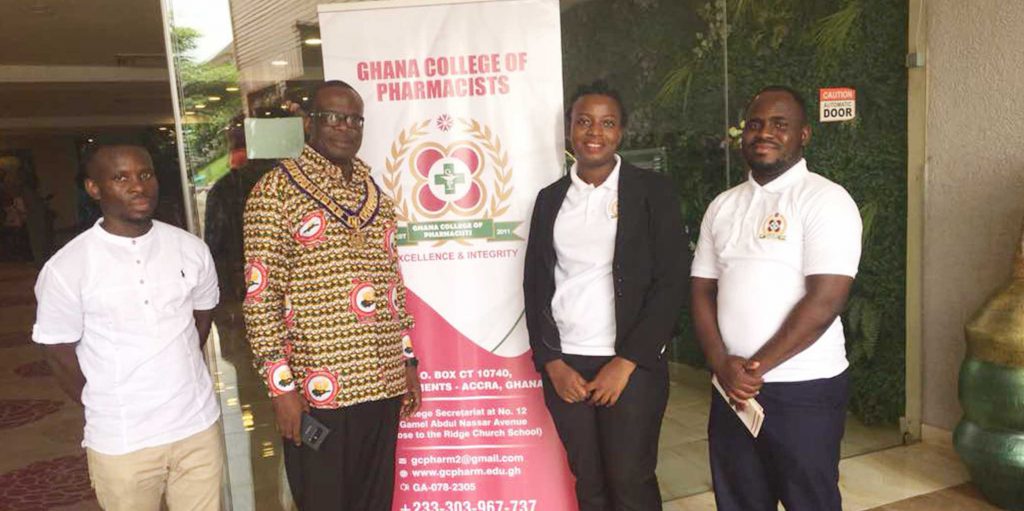The Ghana College of Pharmacists was established by part Four of the specialist Health Training and Plant Medicine Research Act, 2011, Act 833.

The objectives for the College are:
- Promote specialist training in pharmacy and related discipline,
- Promote continuous professional development in pharmacy and related disciplines,
- Promote research in pharmaceutical practice and related discipline, and
- Contribute to the formulation of policies on sound health, medicine and public health generally.
As part of its objectives the Ghana College of Pharmacists ceased the opportunity to exhibit at the Pharmaceutical Society of Ghana Annual General Meeting and to create awareness by marketing the College to prospective applicants.
The following are the objectives for the exhibition;
- To increase enrollment by seeking new applicants.
- To tell prospects about the benefits of enrolling with the college.
- To let them know the courses offered
- To explain the fees and payment terms to them
- The structure and flexibility of the entire programme (sandwich)
- The list of accredited institutions and how their training greatly impact on students
In all, about one thousand brochures and book mark were distributed to pharmacists some took extra to share with friends. One hundred and forty (140) persons pen down their names to be contacted when the College opens for admission.
Below are some of the concerns that were raised by persons who were interested in enrolling;
- Some Pharmacists who are officers in the Ghana Army and work with 37 Military Hospital suggested that it will be good if the College accredit their institution to help facilitate their training especially because they will not be allowed to train outside their institution.
- Prospects with MSc in Pharmacy are suggesting that the college should come up with a policy that will give some exemption to students with such background.
- The threat of Pharm D. Since Pharm D has become a basic requirement most of the pharmacists feel it’s better to enroll on the Pharm D programme for now.
- Some community pharmacists are of the view that the entire programme is suitable for only clinical pharmacists and pharmacists in government institutions rather than those of them in community practice since those doing clinical pharmacy have ample time to do the residency program. One pharmacist said he is only entitled to an annual leave of 15 working days and though he is interested cannot enroll because at the residency level it usually requires a student to train at an institution for like 6months.
- The exhibition team had to debunk the myth that the programme is time consuming by letting them know it a sandwich programme.
- Again, the team made prospects understand that the entire programme is a sandwich course and not the usual classroom base, but rather involves more field practical’s.
- Pharmacists in the Eastern, Western and Brong-Ahafo region wanted the College to consider accrediting some institutions in their region so that it makes it easy for them to train especially at the residency level.
- Some prospects were interested in knowing the academic equivalent of the College’s programme to that of the University and where they will be placed on the salary structure as far as promotion is concern.
- Others are suggesting that the College should consider adding online programmes that will make it easy and facilitate learning for students.
- Finally, Pharmacists suggested continuous professional development programmes (CPD) should be factored as part of the programme.
Action plan:
- The College must put in measures to accredit 37 Military Hospital as one of the training institutions since we are very likely to have some officers enrolling into the College.
- The College must again come out with certain exemption criteria for applicants with background in MSc.
- Also, the College must inspect and liaise with other institution to ensure that they meet the accreditation criteria of the College to facilitate the training of students.
- Finally, the need to organize more continuous professional development programme (CPD’S) for students and non-students of the College.
Conclusion:
In conclusion, the entire team worked effectively and efficiently to ensure the success of the programme, the desired result was achieved the turnout of prospective applicants was encouraging and the team tried as much as possible to answer all mind bothering questions from prospective applicants. The team again tried as much as possible to build rapport with prospective students and assured them of our preparedness to assist them with whatever issue when they enroll unto the programme. It is our hope and prayer that the number of enrollments will increase significantly.





